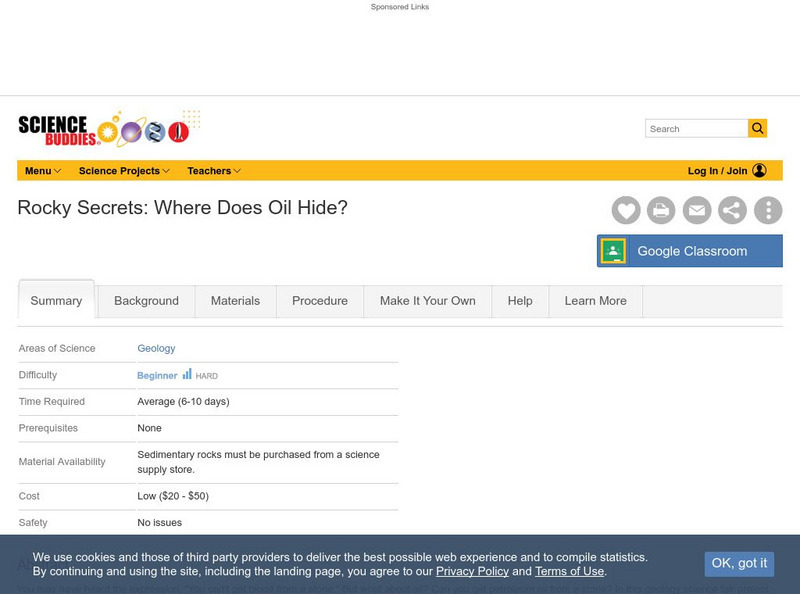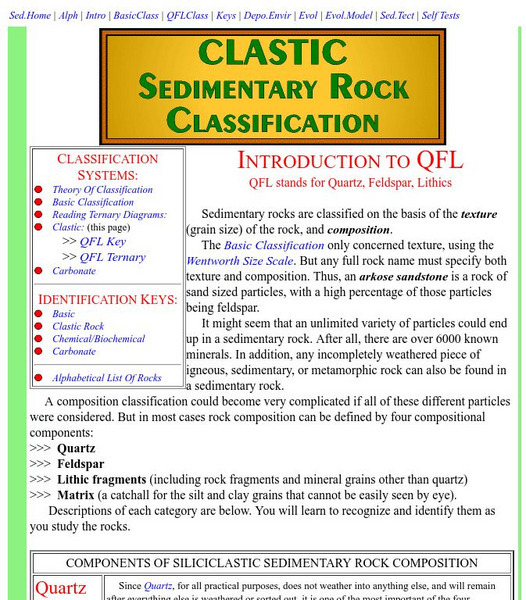American Museum of Natural History
Finding Fossils
How does one go about finding fossils? Find out with an informative webpage that looks at the digging process, showcases rocks and common fossils, helpful tips, and a list of archeological do's and don'ts.
GNS Science
Think like a Geologist: 1
How well do pupils play the role of geologist? Test their abilities in the first installment of a two-part series. Presented with a series of rock formation diagrams, learners write stories to match what they see in the diagrams. The...
Discovery Education
School of Rock
Why do rocks break down over time? Learners explore this concept by simulating physical and chemical weathering of different types of rocks. They use an abrasive to demonstrate physical weathering and acid to demonstrate chemical...
Columbus City Schools
Sedimentary Rocks
Turn your class discussion of rock formation from ho-hum to holy hornfels! Junior geologists gain experience in identifying rock types and rock origins, with an emphasis in hypothesizing the environment needed to form certain rocks. The...
Curated OER
Thirsty Rocks: Please "Porous" a Drink!
A simple activity goes a long way in demonstrating the property of porosity to your rock hounds. They will mass a specimen of dry sandstone and then soak it in a pre-measured amount of water. After seven minutes, they once again measure...
Curated OER
Rocks Worksheet #1
There's not much to this geology handout. There are black and white drawings of five rocks on the top: basalt, gneiss, conglomerate, granite, and sandstone. Five multiple choice questons regarding characteristics and formation of the...
Curated OER
Rocks and Minerals
In this earth science worksheet, students use the clues given at the bottom of the sheet to solve the crossword puzzle on mineral and rocks. They identify the various types of rocks formed and specific examples of these rocks.
Curated OER
Relative Ages of Rocks
In this rock worksheet, students are given a diagram of historical events in rock formation and they label the diagram with the events according to the principle of superposition.
Curated OER
Metamorphic Rocks
In this metamorphic rocks worksheet, students name the components that change in size and shape when metamorphic rocks are formed. Then they describe the metamorphic rock formed from shale and its texture. Students also name the rocks...
Curated OER
Sedimentary Rocks
In this sedimentary rocks worksheet, students list the material that make up sediments and some ways that sedimentary rocks can form. Then they describe kinds of sedimentary rocks and give examples for each. Students also define each of...
Curated OER
General Description of Site
In this earth science instructional activity, students identify what a site matrix is and that is composed of a sandstone mixture. They excavate each quadrant and write detailed journal entries. Students also complete a site map that...
Curated OER
Chemical Weathering
Eighth graders comprehend the effects of chemical and mechanical weathering. They comprehend the differences between the two forms of weathering and the various agents involved in both forms of weathering. Students complete a...
Curated OER
Edible Rock Layers
Pupils use edible food items to conduct an experiment that simulates the movement, folding, and faulting of rock strata like sandstone, siltstone, limestone, and shale. Students then get to eat the experiment when completed.
Curated OER
Making Sedimentary Rocks
Young scholars make models of sedimentary rock layers to explain how rocks form layers and represent ancient environments. Layers of sediment and fossils are added together to simulate the environment and connections to sedimentary rocks...
Curated OER
History of Rock
Seventh graders study rocks and their geology. In this rock history lesson students divide into groups and complete and activity and table.
Curated OER
Metamorphic Rock
In this metamorphic rock worksheet, students review the types of metamorphism and compare foliated with non-foliated. This worksheet has 10 short answer questions.
Science Buddies
Science Buddies: Rocky Secrets: Where Does Oil Hide?
You may have heard the expression, "You can't get blood from a stone." But what about oil? Can you get petroleum oil from a stone? In this geology science fair project, you'll find out what kinds of stones make the best storage rocks for...
James Madison University
James Madison University: Clastic Sedimentary Rock Classification
An upper-level explanation of clastic sedimentary rock classification. Charts, diagrams, and review questions are included. Be sure to click on the PDF Clastic Identification key.
Children's Museum
Children's Museum of Indianapolis: Floating Rock Geo Mysteries
Did you know that there are some rocks that actually float? Follow this interactive investigation to find out which ones and why.
University of Kentucky
University of Kentucky: Rocks and Minerals: Sedimentary Rocks
An excellent resource for learning about sedimentary rocks and how they form. The different types of sedimentary rocks and deposits found in Kentucky are listed, with links to dedicated pages for each. Covers clay, shale, sandstone,...
Other
Geology.com: Rocks: Pictures of Sedimentary Rocks
Presents photographs of examples of clastic, chemical, and organic sedimentary rocks, with short descriptions underneath each rock image. Each rock name is also linked to its own dedicated page with a great deal of additional information...
Northern Arizona University
Colorado Plateau: Chaco Phenomenon
A description of the building done at Chaco Canyon. Find out how the dwellings were built, where the materials came from, the agriculture that supported the population, and the road systems that connected the populace of Chaco Canyon to...
Other
Caterpillar: Ground Rules: Mining Right for a Sustainable Future [Pdf]
This set of lesson plans was developed to accompany Ground Rules: Mining Right for a Sustainable Future, a documentary film created by Caterpillar and Science North. They introduce students to the various phases involved in mining,...
American Museum of Natural History
American Museum of Natural History: O Logy: If Rocks Could Talk: Sandstone
A simple explanation of how sandstone rock is formed.






















